- Home
- Bill Bryson
The Mother Tongue Page 6
The Mother Tongue Read online
Page 6
No king of England spoke English for the next 300 years. It was not until 1399, with the accession of Henry IV, that England had a ruler whose mother tongue was English. One by one English earls and bishops were replaced by Normans (though in some instances not for several years). French-speaking craftsmen, designers, cooks, scholars, and scribes were brought to Britain. Even so, for the common people life went on. They were almost certainly not alarmed that their rulers spoke a foreign tongue. It was a commonplace in the past. Canute from the century before was Danish and even Edward the Confessor, the last but one Anglo-Saxon king, spoke French as his first tongue. As recently as the eighteenth century, England happily installed a German king, George I, even though he spoke not a word of English and reigned for thirteen years without mastering his subjects’ language. Common people did not expect to speak like their masters any more than they expected to live like them. Norman society had two tiers: the French-speaking aristocracy and the English-speaking peasantry. Not surprisingly, the linguistic influence of the Normans tended to focus on matters of court, government, fashion, and high living. Meanwhile, the English peasant continued to eat, drink, work, sleep, and play in English.
The breakdown can be illustrated in two ways. First, the more humble trades tended to have Anglo-Saxon names (baker, miller, shoemaker), while the more skilled trades adopted French names (mason, painter, tailor). At the same time, animals in the field usually were called by English names (sheep, cow, ox), but once cooked and brought to the table, they were generally given French names (beef, mutton, veal, bacon). *
Anglo-Norman differed from the standard French of Paris in several ways. For one thing, Parisian French, called Francien, tended to avoid the “w” sound. So while the Normans pronounced quit, question, quarter, and other such words as if they were spelled kwit, kwestion, and kwarter, Parisians pronounced them with a hard “k” sound. Equally, standard French used cha- in some constructions where the Normans used ca-. Thus we have such differences as carry/charrier, cauldron/chaudron, cattle/chattel. (Our word chattel was adopted later.) The Normans used the suffixes -arie and -orie, while the French used -aire and -oire, which gives us such pairings as victory/victoire and salary/saloire. Anglo-Norman kept the s in words such as August, forest, and beast, while Francien gradually forsook them for a circumflex: Août, forêt, bête. [All of these cited by Baugh and Cable, A History of the English Language, page 176.]
Norman French, like the Germanic tongues before it, made a lasting impact on English vocabulary. Of the 10,000 words we adopted from Norman French, some three-quarters are still in use—among them justice, jury, felony, traitor, petty, damage, prison, marriage, sovereign, parliament, govern, prince, duke, viscount, baron. In fact, nearly all our words relating to jurisprudence and government are of French origin, as are many of the ranks of aristocracy, such as countess, duke, duchess, and baron, but not—perhaps a bit oddly—king and queen. At the same time, many English words were adopted into French. Sometimes it is not possible to tell who was borrowing from whom—whether, for example, we took aggressive from the Normans or they took their agressif from us, or whether the English intensity came before or after the Norman intensité. In other matters, such as syntax, their influence was less dramatic. Only a few expressions like court martial, attorney general, and body politic reflect the habits of French word ordering.
Because English had no official status, for three centuries it drifted. Without a cultural pivot, some place to set a standard, differences in regional usage became more pronounced rather than less. As C. L. Barber notes: “Early Middle English texts give the impression of a chaos of dialects, without many common conventions in pronunciation or spelling, and with wide divergences in grammar and vocabulary” [The Story of Language, page 152].
And yet it survived. If there is one uncanny thing about the English language, it is its incredible persistence. In retrospect it seems unthinkable to us now that it might have been otherwise, but we forget just how easily people forsake their tongues—as the Celts did in Spain and France, as the Vikings did in Normandy, and as the Italians, Poles, Africans, Russians, and countless others all did in America. And yet in Britain, despite the constant buffetings of history, English survived. It is a cherishable irony that a language that succeeded almost by stealth, treated for centuries as the inadequate and second-rate tongue of peasants, should one day become the most important and successful language in the world.
Its lowly position almost certainly helped English to become a simpler, less inflected language. As Baugh and Cable note: “By making English the language mainly of uneducated people, the Norman conquest made it easier for grammatical changes to go forward unchecked.” In Old English, as we have seen, most verbs were not only highly inflected, but also changed consonants from one form to the next, but these were gradually regularized and only one such form survives to this day—was/were. An explicit example of this simplification can be seen in the Peterborough Chronicle, a yearly account of Anglo-Saxon life kept by the monks at Peterborough. Because of turmoil in the country, work on the chronicle was suspended for twenty-three years between 1131 and 1154, just at the period when English was beginning to undergo some of its most dramatic changes. In the earlier section, the writing is in Old English. But when the chronicle resumes in 1154, the language is immeasurably simpler—gender is gone, as are many declensions and conjugations, and the spelling has been greatly simplified. To modern eyes, the earlier half looks to be a foreign language; the later half is unmistakably English. The period of Middle English had begun.
Several events helped. One was the loss by the hapless King John of Normandy to the French crown in 1204. Isolated from the rest of Europe by the English Channel, the Norman rulers gradually came to think of themselves not as displaced Frenchmen but as Englishmen. Intermarrying between Normans and British contributed to the sense of Englishness. The children of these unions learned French from their fathers, but English from their mothers and nannies. Often they were more comfortable with English. The Normans, it must be said, were never hostile to English. William the Conqueror himself tried to learn it, though without success, and there was never any campaign to suppress it.
Gradually, English reasserted itself. French remained, until 1362, the language of Parliament and, for somewhat longer, of the courts, but only for official purposes—rather like Latin in the Catholic Church. For a time, at least up until the age of Chaucer, the two coexisted. Barnett notes that when the Dean of Windsor wrote a letter to Henry IV the language drifted unselfconsciously back and forth between English and French. This was in 1403, three years after the death of Chaucer, so it is clear that French lingered. And yet it was doomed.
By late in the twelfth century some Norman children were having to be taught French before they could be sent away to school [Crystal, The English Language, page 173]. By the end of the fourteenth century Oxford University introduced a statute ordering that students be taught at least partly in French “lest the French language be entirely disused.” In some court documents of this period the syntax makes it clear that the judgments, though rendered in French, had been thought out in English. Those who could afford it sent their children to Paris to learn the more fashionable Central French dialect, which had by this time become almost a separate language. There is telling evidence of this in The Canterbury Tales, when Chaucer notes that one of his pilgrims, the Prioress, speaks a version of French known only in London, “For Frensh of Paris was to hir unknowe.”
The harsh, clacking guttural Anglo-French had become a source of amusement to the people of Paris, and this provided perhaps the ultimate—and certainly the most ironic—blow to the language in England. Norman aristocrats, rather than be mocked for persevering with an inferior dialect that many of them ill spoke anyway, began to take an increasing pride in English. So total was this reversal of attitude that when Henry V was looking for troops to fight with him at Agincourt in 1415, he used the French threat to the English language as a r
allying cry.
So English triumphed at last, though of course it was a very different language—in many ways a quite separate language—from the Old English of Alfred the Great or Bede. In fact, Old English would have seemed as incomprehensible to Geoffrey Chaucer as it does to us, so great had been the change in the time of the Normans. It was simpler in grammar, vastly richer in vocabulary. Alongside the Old English motherhood, we now had maternity, with friendship we had amity, with brotherhood, fraternity, and so on.
Under the long onslaught from the Scandinavians and Normans, Anglo-Saxon had taken a hammering. According to one estimate [Lincoln Barnett, page 97], about 85 percent of the 30,000 Anglo-Saxon words died out under the influence of the Danes and Normans. That means that only about 4,500 Old English words survived—about 1 percent of the total number of words in the Oxford English Dictionary. And yet those surviving words are among the most fundamental words in English: man, wife, child, brother, sister, live, fight, love, drink, sleep, eat, house, and so on. They also include most of the short “function” words of the language: to, for, but, and, at, in, on, and so forth. As a result, at least half the words in almost any sample of modern English writing will be of Anglo-Saxon origin. According to another study cited by McCrum [The Story of English, page 61], every one of the one hundred most common words in English is Anglo-Saxon. To this day we have an almost instinctive preference for the older Anglo-Saxon phrases. As Simeon Potter has neatly put it: “We feel more at ease getting a hearty welcome than after being granted a cordial reception.”
It is sometimes suggested that our vocabulary is vast because it was made to be, simply because of the various linguistic influences that swept over it. But in fact this love of variety of expression runs deeper than that. It was already evident in the early poetry of the Anglo-Saxons that they had an intuitive appreciation of words sufficient to ensure that even if England had never been invaded again her language would have been rich with synonyms. As Jespersen notes, in Beowulf alone there are thirty-six words for hero, twelve for battle, eleven for ship—in short, probably more than exist today.
It is true that English was immeasurably enriched by the successive linguistic waves that washed over the British Isles. But it is probably closer to the truth to say that the language we speak today is rich and expressive not so much because new words were imposed on it as because they were welcomed.
Thanks to the proliferation of English dialects during the period of Norman rule, by the fifteenth century people in one part of England often could not understand people in another part. William Caxton, the first person to print a book in English, noted the sort of misunderstandings that were common in his day in the preface to Eneydos in 1490, in which he related the story of a group of London sailors heading down the River “Tamyse” for Holland who found themselves becalmed in Kent. Seeking food, one of them approached a farmer’s wife and “axed for mete and specyally he axyd after eggys” but was met with blank looks by the wife who answered that she “coude speke no frenshe.” The sailors had traveled barely fifty miles and yet their language was scarcely recognizable to another speaker of English. In Kent, eggs were eyren and would remain so for at least another fifty years.
A century later the poet George Puttenham noted that the English of London stretched not much more than sixty miles from the city. But its influence was growing all the time. The size and importance of London guaranteed that its dialect would eventually triumph, though other factors helped—such as the fact that the East Midlands dialect (its formal name) had fewer grammatical extremes than other dialects and that the East Midlands area was the seat of the two main universities, Oxford and Cambridge, whose graduates naturally tended to act as linguistic missionaries.
Chaucer’s was the language of London—and therefore comparatively easy for us to follow. We may not instantly apprehend all the words, but when we see the prologue of The Canterbury Tales we can at the very least recognize it as English:
When that Aprille with his shoures sote
The droghte of Marche hath perced to the rote,
And bathed every veyne in swich licour,
Of which vertue engendred is the flour.
Compare that with this passage in the Kentish dialect written at about the same time: “And vorlet ous oure yeldinges: ase and we vorleteþ oure yelderes, and ne ous led naȝt, in-to vondinge, ac vri ous vram queade.” Recognize it? It’s the last sentence of the Lord’s Prayer, beginning, “And forgive us our trespasses . . .” As the Chaucer authority David Burnley notes, many of the poet’s contemporaries outside London were still using spellings and phrasings that “make their works scarcely intelligible to us without special study” [Chaucer’s Language, page 10]. Some of the dialects of the north were virtually foreign languages—and indeed can sometimes still seem so.
This was a period of the most enormous and rapid change in English, as Caxton himself noted when he wrote: “And certaynly our langage now used varyeth ferre [far] from that which was used and spoken when I was borne.” Caxton was born just twenty-two years after Chaucer died, yet in the space of that time the English of London moved from being medieval to modern. The difference is striking. Where even now we can understand Chaucer only with a fair lavishing of footnotes, Caxton can be as easily followed as Shakespeare. Caxton’s spellings often look curious to us today, but the vocabulary is little changed, and we can read him at more or less normal speed, as when he writes: “I was sittyng in my study [when] to my hande came a lytle booke in frenshe, which late was translated oute of latyn by some noble clerke of fraunce. . . .”
Even so, English by Chaucer’s time had already undergone many consequential changes. The most notable is that it had lost most of its inflections. Gender had disappeared in the north of England and was on its knees in the south. Adjectives, which had once been inflected up to eleven ways, now had just two inflections, for singular and plural (e.g., a fressh floure, but fresshe floures), but even here there was a growing tendency to use one form all the time, as we do today.
Sometimes words were modified in one grammatical circumstance but left untouched in another. That is why we have knife with an f but knives with a v. Other such pairs are half/halves, grass/graze, grief/grieve, calf/calves. Sometimes there was a spelling change as well, as with the second vowel in speech and speak. Sometimes the pronunciation changed, as between bath and bathe and as with the “s” in house becoming a “z” in houses. And sometimes, to the eternal confusion of non-English speakers, these things happened all together, so that we have not only the spelling doublet life/lives but also the pronunciation doublet “līves” and “lĭves” as in “a cat with nine lives lives next door.” Sometimes, too, conflicting regional usages have left us with two forms of the word, such as fox with an f, but vixen with a v, or given us two spellings for words, such as phial and vial. And sometimes, as we shall see later, they left us with some of the mostly wildly unphonetic spellings of any language in the world.
Although East Midlands was the preeminent dialect, not all East Midlands forms triumphed. The practice in London of placing -n or -en on the end of present indicative verbs was gradually driven out by the southern practice of using -th, so that loven became loveth, for instance, and this in turn was eventually driven out by the northern -s or -es ending, as in the modern form loves. Why this northern provincialism should gradually have taken command of a basic verb form is an enduring mystery. It may simply be that the -s form made for smoother spoken English. In any case, by Shakespeare’s time it was much more common in speech than in writing, though Shakespeare himself freely used both forms, sometimes employing goes, sometimes goeth.
Casualness of usage and style was a hallmark of the Middle and early modern English periods. Chaucer sometimes used doughtren for the plural of daughters and sometimes doughtres, sometimes yeer and sometimes yeres. Like other writers of the period, he appeared to settle on whichever form first popped into his head, even at the risk of being inconsistent from one pa
ragraph to the next.
But, I must quickly interject, a problem with interpreting Chaucer is that none of his original manuscripts survive. Everything we have of his was copied by medieval scribes, who sometimes took extraordinary liberties with the text, seeing themselves more as editors than as copyists. At the same time, they were often strikingly careless. For example, the Clerk’s Tale contains the line “Ther stood a throop of site delitable,” but in various manuscripts site is rendered as sighte, syth, sigh, and cite. It is impossible at this remove to know which was the word Chaucer intended. Literally scores of such confusions and inconsistencies clutter the manuscripts of most poets of the age, which makes an analysis of changes in the language problematic. It is often noted that Chaucer’s spelling was wildly inconsistent: Cunt, if you will forgive an excursion into crudity (as we so often must when dealing with Chaucer), is spelled in at least five ways, ranging from kent to quainte. So it isn’t possible to say whether the inconsistency lies with Chaucer or his copyists or both.
Other forms, such as plural pronouns, had yet to settle. Chaucer used hi, hem, and her for they, them, and their (her for their survived up to the time of Shakespeare, who used it at least twice in his plays). Similarly his, where we now use its, was the usual form until about 1600, which is why the King James Bible is full of constructions like “If the salt has lost his savour, wherewith shall it be salted?” Similarly, which was until about the same time often used of animate things as well as inanimate, as in the form of the Lord’s Prayer still used in England: “Our Father which art in heaven.”
In Old English there were at least six endings that denoted plurals, but by Shakespeare’s time these had by and large shrunk to two: -s and -en. But even then the process was nowhere near complete. In the Elizabethan Age, people sometimes said shoes and sometimes shoen, sometimes house and sometimes housen. It is interesting to reflect that had the seat of government stayed in Winchester, rather than moved the sixty miles or so to London, we would today very probably be talking of six housen and a pair of shoen. Today there are just three of these old weak plurals: children, brethren, and oxen. However, even though -s (or -es after an -sh spelling) has become the standard form for plurals, there are still traces of the complex Old English system lurking in the language in plurals such as men, women, feet, geese, and teeth.

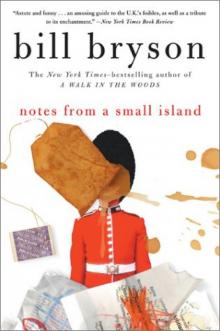 Notes from a Small Island
Notes from a Small Island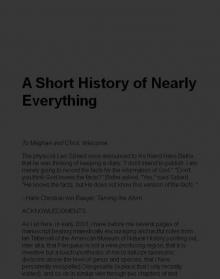 A Short History of Nearly Everything
A Short History of Nearly Everything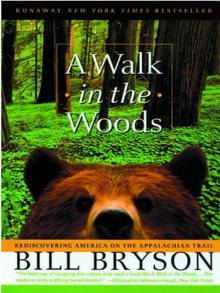 A Walk in the Woods
A Walk in the Woods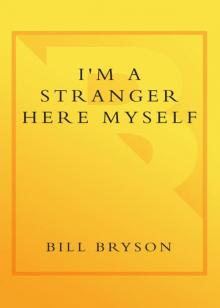 I'm a Stranger Here Myself
I'm a Stranger Here Myself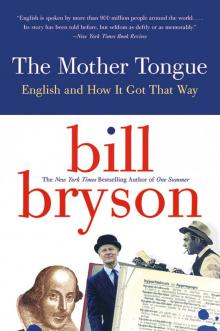 The Mother Tongue
The Mother Tongue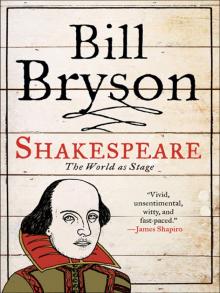 Shakespeare
Shakespeare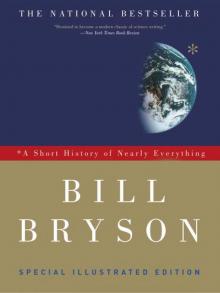 A Short History of Nearly Everything: Special Illustrated Edition
A Short History of Nearly Everything: Special Illustrated Edition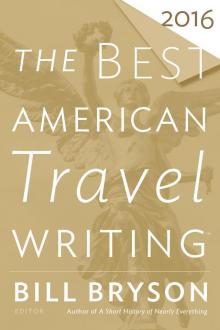 The Best American Travel Writing 2016
The Best American Travel Writing 2016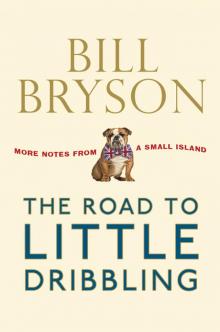 The Road to Little Dribbling
The Road to Little Dribbling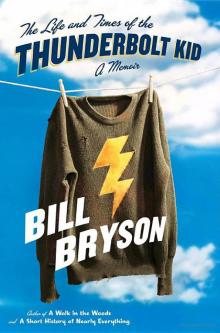 The Life And Times Of The Thunderbolt Kid: A Memoir (v5.0)
The Life And Times Of The Thunderbolt Kid: A Memoir (v5.0)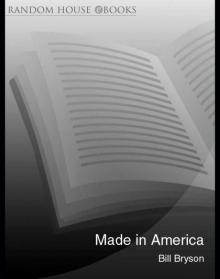 Made In America
Made In America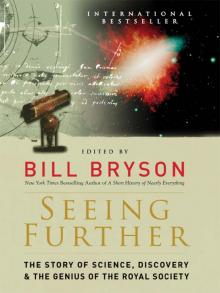 Seeing Further
Seeing Further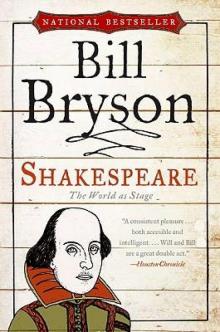 Shakespeare: The World as Stage
Shakespeare: The World as Stage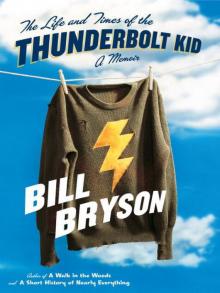 The Life and Times of the Thunderbolt Kid
The Life and Times of the Thunderbolt Kid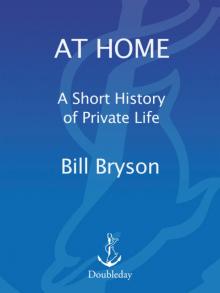 At Home
At Home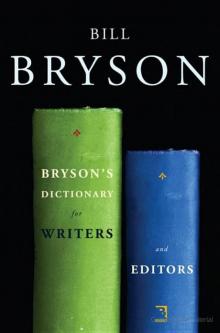 Bryson's Dictionary For Writers And Editors (v5.0)
Bryson's Dictionary For Writers And Editors (v5.0) Neither Here Nor There
Neither Here Nor There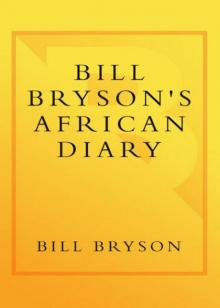 Bill Bryson's African Diary
Bill Bryson's African Diary